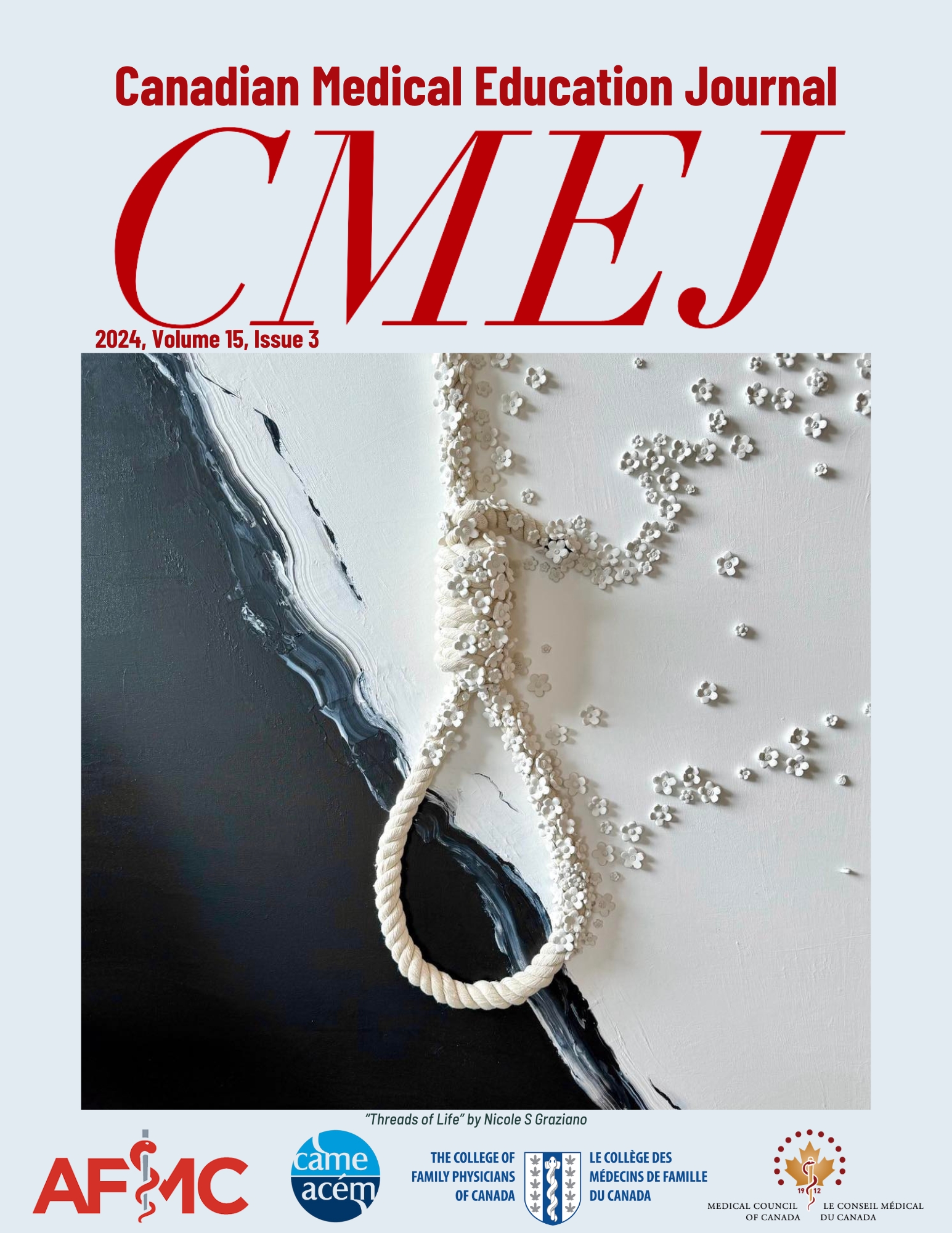Evaluation of a novel virtual reality immersive clinical experience to enhance medical education curriculum
DOI:
https://doi.org/10.36834/cmej.73165Abstract
Implication Statement
Medical students often find the transition to clerkship challenging and stressful. The use of virtual reality (VR) technologies such as screen-based learning, 360-video and immersive VR using head-mount-devices is becoming more utilized in medical education. Immersive technologies in particular have been shown to lead to greater enthusiasm and provide higher knowledge gain for students compared to screen-based VR. The University of British Columbia Faculty of Medicine has developed a novel immersive patient experience using VR to enhance the clinical skills program and evaluate student perception regarding its formal integration into curricula. Students reported positive feedback on the experience, and interest in more immersive learning opportunities in future sessions. VR technology has the potential to enhance medical education and provide a safe immersive learning environment to build clinical acumen.
References
Poncelet A, O'Brien B. Preparing medical students for clerkships: a descriptive analysis of transition courses. Acad Med. 2008;83(5). https://doi.org/10.1097/ACM.0b013e31816be675 DOI: https://doi.org/10.1097/ACM.0b013e31816be675
Surmon L, Bialocerkowski A, Hu W. Perceptions of preparedness for the first medical clerkship: a systematic review and synthesis. BMC Med Educ. 2016;16(1):89. https://doi.org/10.1186/s12909-016-0615-3 DOI: https://doi.org/10.1186/s12909-016-0615-3
Leppink J, Duvivier R. Twelve tips for medical curriculum design from a cognitive load theory perspective. Med Teach. 2016 Jul 2;38(7):669-74. https://doi.org/10.3109/0142159X.2015.1132829 DOI: https://doi.org/10.3109/0142159X.2015.1132829
Barteit S, Lanfermann L, Bärnighausen T, Neuhann F, Beiersmann C. Augmented, mixed, and virtual reality-based head-mounted devices for medical education: systematic review. JMIR Serious Games. 2021;9(3):e29080. https://doi.org/10.2196/29080 DOI: https://doi.org/10.2196/29080
Gutiérrez F, Pierce J, Vergara V, et al. The effect of degree of immersion upon learning performance in virtual reality simulations for medical education. Stud Health Technol Inform. 2007 Feb 1;125:155-60. https://doi.org/10.1097/00042871-200701010-00099 DOI: https://doi.org/10.1097/00042871-200701010-00099
Deladisma AM, Gupta M, Kotranza A, et al. A pilot study to integrate an immersive virtual patient with a breast complaint and breast examination simulator into a surgery clerkship. Am J Surg. 2009;197(1):102-6. https://doi.org/10.1016/j.amjsurg.2008.08.012 DOI: https://doi.org/10.1016/j.amjsurg.2008.08.012
Kyaw BM, Saxena N, Posadzki P, et al. Virtual reality for health professions education: systematic review and meta-analysis by the digital health education collaboration. J Med Internet Res. 2019;21(1). https://doi.org/10.2196/12959 DOI: https://doi.org/10.2196/12959
Moro C, Štromberga Z, Raikos A, Stirling A. The effectiveness of virtual and augmented reality in health sciences and medical anatomy. Anat Sci Educ. 2017 Nov 1;10(6):549-59. https://doi.org/10.1002/ase.1696 DOI: https://doi.org/10.1002/ase.1696
Stairs J, Amir B, Vair B. The "virtual OR:" creation of a surgical video-based gynaecologic surgery teaching session to improve medical student orientation and supplement surgical learning during COVID-19. Can Med Educ J. 2021 Sep 14;12(4):149-51. https://doi.org/10.36834/cmej.72081 DOI: https://doi.org/10.36834/cmej.72081
Downloads
Published
Issue
Section
License
Copyright (c) 2023 Michael Lai, Kamyar Taheri, Rem Aziz, Paul Milaire, Zachary Rothman, Kevin Shi, Alasdair Nazerali-Maitland

This work is licensed under a Creative Commons Attribution-NonCommercial-NoDerivatives 4.0 International License.
Submission of an original manuscript to the Canadian Medical Education Journal will be taken to mean that it represents original work not previously published, that it is not being considered elsewhere for publication. If accepted for publication, it will be published online and it will not be published elsewhere in the same form, for commercial purposes, in any language, without the consent of the publisher.
Authors who publish in the Canadian Medical Education Journal agree to release their articles under the Creative Commons Attribution-Noncommercial-No Derivative Works 4.0 Canada Licence. This licence allows anyone to copy and distribute the article for non-commercial purposes provided that appropriate attribution is given. For details of the rights an author grants users of their work, please see the licence summary and the full licence.











